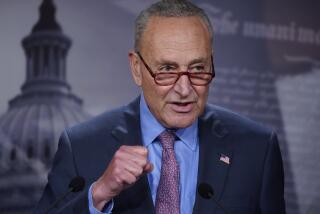First Lady Scores Alternative Health Bill : Reform: Mrs. Clinton says the plan submitted by Rep. Cooper would not assure universal coverage. She praises two other proposals, though.
- Share via
WASHINGTON — Seeking to prevent the formation of a conservative coalition against the Administration’s health care reform plan, First Lady Hillary Rodham Clinton on Monday strongly criticized the leading alternative advocated by conservative and moderate Democrats in the House.
There is no indication that the plan, sponsored by Rep. Jim Cooper (D-Tenn.), could achieve universal health coverage, Mrs. Clinton said, describing that as “the fundamental test” for what the Administration would consider acceptable.
Moreover, she asserted, Cooper’s plan would do nothing to control the federal deficit, would increase taxes for millions of Americans and would “add an extra layer of uncertainty” over benefits by leaving them up to a government-established board, rather than spelling them out in legislation as the White House plan does.
By contrast, Mrs. Clinton once again lavished praise on a plan by Sen. John H. Chafee, a moderate Republican from Rhode Island. Chafee’s plan, along with the Administration’s proposal and a single-payer alternative offered by liberal members of Congress are the only three plans that assure universal coverage, she said.
Cooper has presented his bill, co-sponsored by Republican Rep. Fred Grandy of Iowa, as the eventual shape of a health care reform compromise. “We’re really much closer to the Administration’s plan than they acknowledge,” Cooper said in an interview.
But in the eyes of some Administration officials, Cooper’s proposal is far more ominous--a gun aimed directly at the heart of their plan.
Administration officials have hoped to use current middle-class discontent with the existing health care system as a vehicle for achieving the longstanding liberal goal of health coverage for everyone. The Clintons and their advisers argue that only a universal program can guarantee what middle-class Americans most want--certainty that their health benefits will always be there.
But conservatives argue that the problems faced by the middle class can be separated from the more expensive proposition of providing coverage for those who do not have insurance--primarily low-wage workers.
Cooper argues for a phased-in approach--one that would first reform insurance markets and establish a managed competition plan that could bring costs under control and resolve some of the problems faced by small businesses and the middle class. After a few years of experience with managed competition, he argues, Congress could pass a second bill to cover those Americans without insurance. The Clinton plan would impose too many costs too quickly with too many unknowns, he argues. “You need to aim before you shoot,” he said.
But Mrs. Clinton and other Administration figures fear that the time for that second bill would never arrive. If the issue of universal coverage is separated from the current crisis, they fear, the chance to achieve the goal almost certainly would evaporate.
That policy debate quickly translates into fundamental political arithmetic: The White House can win the health care battle only by getting support from at least some moderate Republicans and conservative Democrats. But that key bloc of votes is also being wooed by Cooper and his Senate counterpart, Sen. John B. Breaux (D-La.).
Administration officials, therefore, have tried to move rapidly to cement a coalition with legislators, such as Chafee, while painting the more conservative proposals as unacceptable.
Mrs. Clinton did her best to claim Chafee and his co-sponsors as supporters already. Those sponsors include Senate Minority Leader Bob Dole (R-Kan.) and other leading GOP lawmakers, such as Sen. Nancy Landon Kassebaum of Kansas and John C. Danforth of Missouri. “I’ve been at several public forums” where those senators “all claim” that universal coverage is their objective, she said. “I have no reason to doubt them whatsoever.”
As the White House strategy has developed on health care, Mrs. Clinton has taken a “bad cop” role--sternly spelling out the problems with critics and alternatives--while her husband offers to negotiate with all comers. Indeed, as Mrs. Clinton was criticizing Cooper’s plan, the congressman was saying in an interview that Administration criticism of his ideas had “lightened up” recently--reflecting the “good cop” side of the Administration’s approach.
Cooper’s plan and similar bills “do not, as a matter of design, move in a direction that could fairly be construed as achieving universal coverage,” Mrs. Clinton said. Because of that, “there cannot be any comparison” between those plans and the Administration’s.
The Cooper and Breaux proposals essentially would enact a series of changes in the way insurance is sold--changes designed to make insurance less expensive for small businesses by setting up large purchasing pools and by prohibiting insurance companies from refusing to cover people with “pre-existing conditions.” The bill provides some subsidies to make insurance more affordable to the poor.
More to Read
Get the L.A. Times Politics newsletter
Deeply reported insights into legislation, politics and policy from Sacramento, Washington and beyond. In your inbox twice per week.
You may occasionally receive promotional content from the Los Angeles Times.











